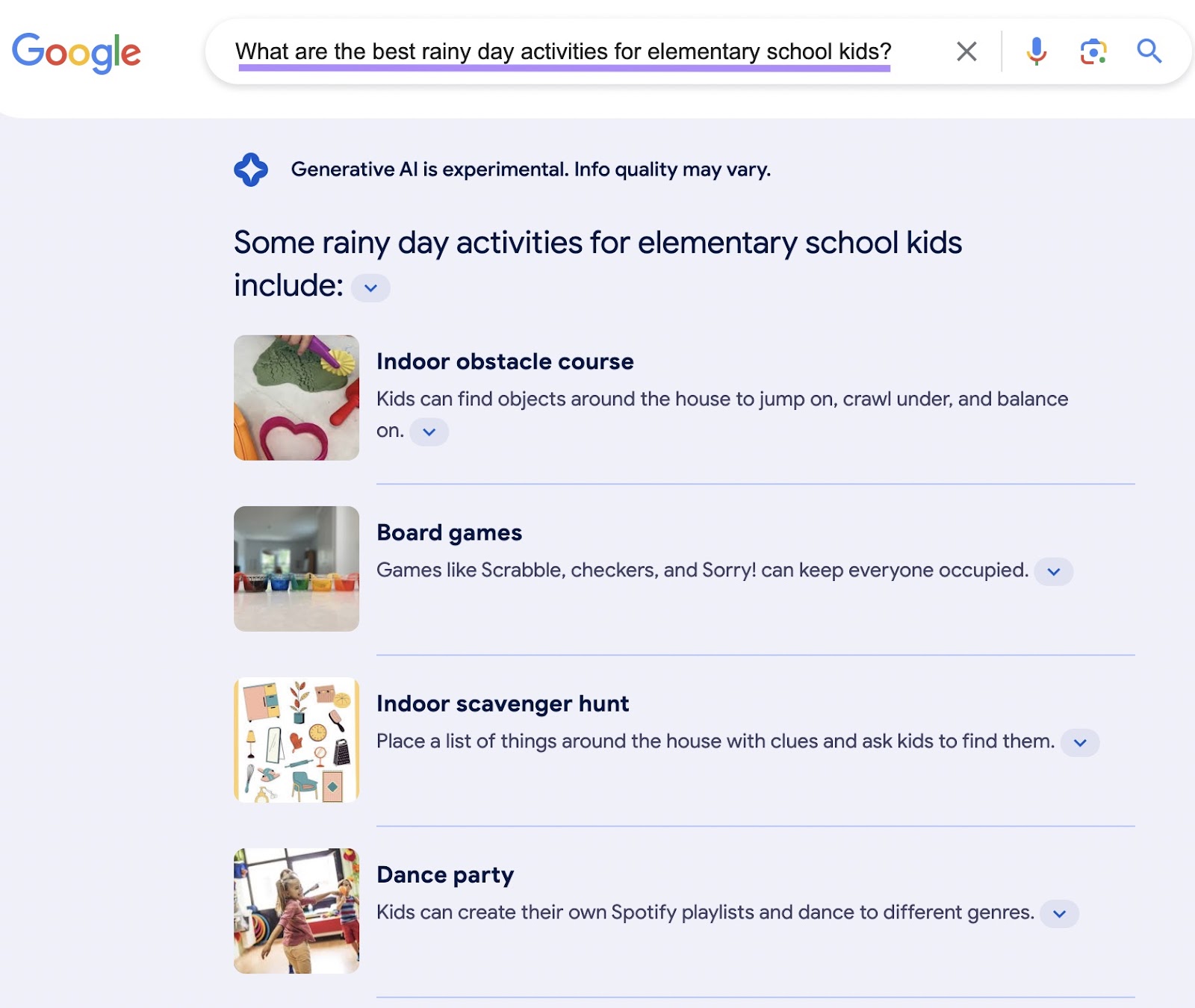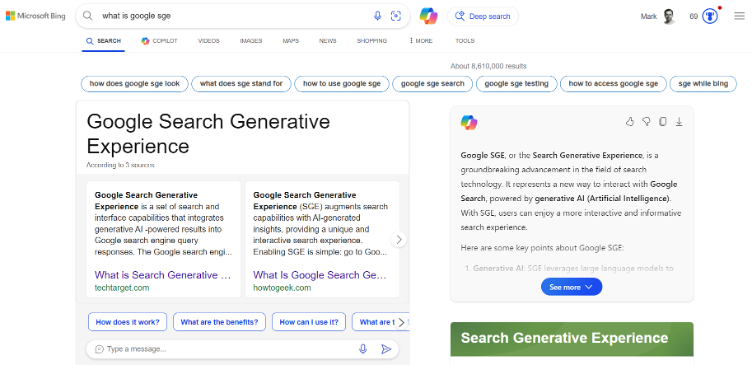Google launching UK test of Search Generative Experience using AI

By Mark Chalcraft|9 Apr 2024
SEO | 4 MIN READ
Google has been experimenting with generative AI to create part of its search results in the USA for about 12 months. Now, the BBC reports that some searchers in the UK will start to see this Search Generative Experience (SGE).
So, what can we expect to see as this evolves? What does this mean for businesses and marketers? Let’s explore these questions and their implications.
What is SGE and what does it look like?
Currently, Google displays a generative content panel in some search results. It’s not that unfamiliar; a selection of links accompanies snippets of content, but they occupy a prime position in the search results.
There are different formats depending on the search and its context, and these may be subject to change as Google’s experiments develop.


Images copyright and courtesy of SEMRush
Recent media reports have suggested SGE might become a paid feature alongside the standalone Gemini product, which replaced Bard.
Comparing with Bing’s generative AI search experience
Bing has been far more aggressive in releasing its own generative AI experience, and it had far less to lose in doing so.
It also provides summary panels in its results and offers a standalone version of CoPilot on a separate tab. Here’s an example of the former that shows up for me, showing the generative summary with CoPilot icons plus a text field for users to type further queries:

How will search change in future?
This question is the hardest to answer. While there have been rumours that Google will soon fully launch SGE (to coincide with its upcoming I/O conference), this seems unlikely. However, it’s difficult to predict how things will evolve even within the next six months. Rather than make speculative predictions, let’s consider the factors influencing what happens next.
Why things could change quickly
Google's position as a global search leader is under pressure, perhaps more so than ever. Its response to the launch of ChatGPT and OpenAI's partnership with Microsoft damaged its stock price, and pressure and expectations are high.
A flood of AI-generated content created a quality issue in Google's search results and some unwanted press coverage. Action against nullifying this content is now underway.
The promotion of Elizabeth Reid to head up Google's search products is a further sign that Google is trying to refresh things.
In addition, the fact that Google faces left-field threats from the likes of TikTok has also gained widespread coverage. While much of this was overblown, the sense is that younger generations might be less inclined to rely exclusively on Google's products.
Overall, Google seems to be an increasingly defensive company that needs to be seen as responding quickly.
Why change might happen more slowly
To get SGE to a point where it could reliably appear for all search users, Google faces several challenges:
- Accuracy of information. Generative AI is known to produce inaccurate information. The AI industry calls this ‘hallucination’, which happens because of how generative AI works. Simply put, tools like ChatGPT calculate the next word in a sequence based on probability. Until this is solved, assuming it can be, there is a risk that content created by AI will be incorrect.
- Regulatory hurdles. Lawmakers worldwide are already targeting generative AI technology. A new legal framework governing AI has been approved in the EU, while the US and UK have agreed to cooperate on AI safety.
- Ethical concerns. That regulatory scrutiny results from some very troubling side-effects of AI technology. Privacy and security are being attacked in new ways, and governments, businesses, and individuals are facing new threats. Perhaps greatest of all is the potential environmental impact, with net-zero targets already looking out to react
- Energy usage. AI’s electricity use is staggeringly high and significantly more than what is needed to run a traditional search engine. Whether Google’s infrastructure is ready for an exponential increase is questionable. For example, Microsoft and Open AI are investing huge sums into new data centres
Given these challenges and the legal jeopardy they could presumably result in, there’s no absolute certainty that SGE will stay the course. Google has been careful to refer to it throughout as experimental. Plus, recall what happened to Google’s efforts to counter or react to the rise of social media.
What could this mean for businesses?
This all means that businesses need to be prepared to adapt, but they shouldn’t be overly hasty at this stage. There are currently two trains of thought.
- SGE will reduce organic website traffic as Google finds new ways to keep people on search. This is the perennial marketing fear. For example, could Google use SGE to increase the number of paid ads it displays? Or would this annoy users who prefer to scroll past these and select from the organic results?
- Not much will change. Finding relevant websites remains a primary reason for people to use a search engine. Tests in the US so far have included more organic links as time has passed, indicating that SGE will become a search feature that still delivers organic traffic. This is similar to how featured results work.
Which of these proves correct, and how long it will take, time will tell. Neither would be greatly surprising.
The good news is that one fundamental won’t change. People still need and want the products and services businesses offer and need related information to help them.
What should marketers do to adapt?
For some years, marketers have been able to succeed in SEO with mediocre content. The web is filled with generic 1,500-word articles that have been written to a templated brief by a copywriter with minimal expertise in the topic. We've all seen them. This was, as AJ Kohn put it, "Goog enough".
E-E-A-T is a well-known SEO concept, although too many still take the guidance too literally. It means that content needs to be created based on understanding how to meet a user's needs. For this, we need knowledge of our audience and empathy—not some 15-point checklist of SEO best practices.
We have been helping clients make this shift in mindset for ten years, so we have experience in approaching it.
- Broaden keyword research into audience research
- Don't rely on data alone. Talk to your users directly
- Work on user experience and SEO together
- Don't just write content, design it
- Focus on topical expertise relevant to your brand
- Include subject matter experts and demonstrate their credentials
Are you worried about the effects of SGE on your organic traffic? Do you fear Google will become less relevant in the future, and how will that play a part in your own business and gaining exposure? If you have concerns, talk to our team - Contact us.